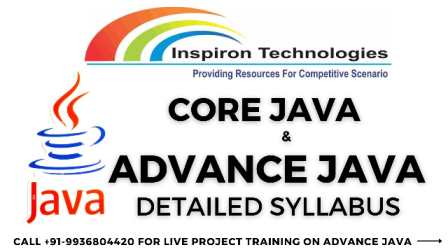Core Java and Advance Java Syllabus

Java Tutorial- Important Chapters of Core Java and Advance Java
A general outline of the topics covered in each for Core Java and Advanced Java is as follows:
Core Java:
Introduction to Java
Variables, data types, and operators
Control statements and loops
Classes, objects, and methods
Arrays and strings
Inheritance and polymorphism
Interfaces and abstract classes
Exception handling
File handling and I/O streams
Multithreading and synchronization
Advanced Java:
JDBC (Java Database Connectivity)
Servlets and JSP (JavaServer Pages)
JavaBeans and EJB (Enterprise JavaBeans)
Struts Framework
Spring Framework
Hibernate Framework
Web Services and SOAP (Simple Object Access Protocol)
RESTful web services
AJAX (Asynchronous JavaScript and XML)
JUnit and Testing frameworks
In general, Core Java covers the fundamental concepts of Java programming such as object-oriented programming, basic data types, control statements, and exception handling. Advanced Java builds on these concepts and introduces more complex topics such as database connectivity, web development, and testing frameworks.
It is important to note that these topics are not mutually exclusive and often overlap in real-world applications. Additionally, the specific details and depth of coverage for each topic can vary depending on the level and duration of the course.
For example, a beginner-level Core Java course may only cover the basics of classes, objects, and methods, while an advanced-level Core Java course may also include topics such as generics, annotations, and lambda expressions. Similarly, an introductory-level Advanced Java course may cover basic concepts of JDBC and Servlets, while an advanced-level course may delve into advanced concepts of JPA (Java Persistence API) and Spring Boot.
In addition to the topics mentioned above, other important skills that may be covered in both Core Java and Advanced Java courses include debugging techniques, code optimization, and best practices for software development.
Overall, Core Java and Advanced Java are crucial courses for individuals interested in pursuing a career in software development or programming. A strong understanding of Core Java concepts is necessary before moving on to Advanced Java, and mastering both can open up opportunities in a variety of industries, such as finance, healthcare, and e-commerce.
Moreover, Java is a popular programming language used for developing a wide range of applications, from mobile apps and web applications to enterprise software and gaming. It is also used for developing software for various platforms, including Windows, Linux, and Android.
Having a strong understanding of both Core Java and Advanced Java can be beneficial for developers, as it allows them to create complex and efficient software solutions. Furthermore, Java's platform independence and security features make it a popular choice for developing secure and scalable applications.
In summary, Core Java and Advanced Java courses cover a wide range of topics related to Java programming, from fundamental concepts to advanced topics such as web development and testing frameworks. These courses are essential for individuals interested in pursuing a career in software development and can provide them with the necessary skills to create efficient and secure software solutions.
Some additional topics that may be covered in both Core Java and Advanced Java courses include:
Collections: Java provides a number of built-in collection classes and interfaces that can be used to manage groups of objects. These include ArrayList, LinkedList, HashSet, HashMap, and more.
Reflection: Reflection is a mechanism in Java that allows a program to examine and modify the behavior of objects at runtime. It can be used to create objects, invoke methods, and access fields dynamically.
Networking: Java provides a number of classes and interfaces for network programming, including sockets, URLs, and HTTP connections.
Security: Java has built-in security features such as bytecode verification, classloader, and sandboxing that help to prevent malicious code from executing on a user's machine.
Concurrency: Java has extensive support for multithreading and concurrency, which allows developers to create high-performance, scalable applications.
Design patterns: Java developers often use design patterns to solve common problems in software development. Some commonly used design patterns in Java include Singleton, Factory, Observer, and MVC (Model-View-Controller).
It is important to note that the depth and coverage of each of these topics may vary depending on the level of the course. However, having a strong understanding of these topics can be beneficial for developers and can help them to create efficient, scalable, and secure software solutions using Java.
In addition to the topics mentioned above, other important skills that may be covered in Core Java and Advanced Java courses include:
Unit testing: Unit testing is an essential part of software development, and Java provides a number of testing frameworks such as JUnit, TestNG, and Mockito that can be used to automate the testing process.
Design and architecture principles: Java developers often use design and architecture principles such as SOLID, DRY, and KISS to create maintainable and scalable code.
Deployment and packaging: Java provides tools such as Maven, Gradle, and Ant that can be used to automate the deployment and packaging process for Java applications.
Performance tuning: Java developers may need to optimize the performance of their applications to ensure that they can handle large amounts of data or traffic. Techniques such as profiling, caching, and asynchronous programming can be used to improve the performance of Java applications.
Java frameworks: Java frameworks such as Spring, Hibernate, and Struts can be used to simplify the development process for Java applications and provide a number of pre-built components and modules that can be used to create complex applications more quickly.
Overall, Core Java and Advanced Java courses are essential for individuals interested in pursuing a career in Java programming. A strong understanding of Core Java concepts is necessary before moving on to Advanced Java, and mastering both can open up a wide range of opportunities in software development. With the popularity and versatility of Java, mastering Core Java and Advanced Java can be a valuable asset for any developer.
To give you a better idea of what each course might cover, here is a sample syllabus for both Core Java and Advanced Java courses:
Core Java Syllabus:
Introduction to Java: History and evolution of Java, features of Java, JDK, JRE, and JVM.
Object-Oriented Programming Concepts: Classes, objects, methods, inheritance, polymorphism, encapsulation, and abstraction.
Control Structures: Loops, conditional statements, and switch statements.
Arrays and Strings: Arrays, one-dimensional and multi-dimensional arrays, and string manipulation.
Exception Handling: Handling runtime errors and exceptions using try-catch blocks and throw statements.
File Handling: Reading and writing to files, file input/output streams, and serialization.
Interfaces and Packages: Creating interfaces and packages, and organizing classes and interfaces into packages.
Generics: Introduction to generics, creating generic classes, methods, and interfaces.
Collections: Introduction to collections framework, collections interfaces and classes, lists, sets, and maps.
Multi-threading: Introduction to multi-threading, creating and managing threads, synchronization, and thread safety.
Advanced Java Syllabus:
JDBC: Introduction to JDBC, connecting to databases, executing SQL queries, and processing result sets.
Servlets: Introduction to Servlets, Servlet architecture, life cycle of a Servlet, ServletContext, and ServletConfig.
JSP: Introduction to JSP, JSP architecture, JSP scripting elements, JSP directives, and JSP implicit objects.
JSTL: Introduction to JSTL, core tags, formatting tags, conditional tags, and looping tags.
Struts Framework: Introduction to Struts framework, Struts architecture, configuration files, and Struts tags.
Hibernate Framework: Introduction to Hibernate framework, Hibernate architecture, configuration files, and Hibernate mapping.
Spring Framework: Introduction to Spring framework, Spring architecture, configuration files, and Spring modules.
RESTful Web Services: Introduction to RESTful web services, RESTful principles, creating RESTful web services using Jersey.
Testing Frameworks: Introduction to JUnit and TestNG, creating and running test cases, and using assertions.
Design Patterns: Introduction to design patterns, Singleton, Factory, Observer, and MVC pattern.
It is important to note that the syllabus may vary depending on the institution or organization offering the course, and may also depend on the level of the course. However, this sample syllabus provides a good idea of what topics might be covered in each course.
Sure, here are some more advanced topics that may be covered in an Advanced Java course:
Security: Java provides a number of security features such as authentication, encryption, and digital signatures. Advanced Java courses may cover security concepts and techniques such as secure coding practices, SSL/TLS, and Java security architecture.
JavaFX: JavaFX is a rich graphical user interface toolkit for Java that allows developers to create desktop and mobile applications with rich user interfaces. Advanced Java courses may cover JavaFX concepts such as scene graph, event handling, and controls.
Web Application Frameworks: Java web application frameworks such as Spring MVC and Struts can be used to simplify the development of web applications. Advanced Java courses may cover the concepts and techniques used in web application development, such as handling user input, authentication and authorization, session management, and MVC architecture.
Java Persistence API: Java Persistence API (JPA) is a Java specification for object-relational mapping (ORM) that allows Java developers to map Java objects to relational database tables. Advanced Java courses may cover JPA concepts such as entity classes, relationships, persistence contexts, and JPQL (Java Persistence Query Language).
Enterprise JavaBeans: Enterprise JavaBeans (EJB) is a Java API for building enterprise applications. Advanced Java courses may cover EJB concepts such as session beans, message-driven beans, transactions, and dependency injection.
Advanced I/O: Java provides a rich set of I/O classes and interfaces for working with files, sockets, and streams. Advanced Java courses may cover advanced I/O concepts such as file locking, memory-mapped files, non-blocking I/O, and asynchronous I/O.
Big Data: With the rise of big data, Java has become an important language for big data processing. Advanced Java courses may cover concepts and technologies used in big data processing such as Hadoop, MapReduce, and Apache Spark.
Concurrency: Java provides powerful concurrency support through its multithreading and synchronization features. Advanced Java courses may cover advanced concurrency topics such as thread pools, Executors framework, Concurrent Collections, and parallel processing.
Performance Tuning: Java provides a number of tools and techniques for performance tuning of Java applications. Advanced Java courses may cover performance tuning concepts such as profiling, memory management, garbage collection, and optimization techniques.
Cloud Computing: Cloud computing has become an important technology for modern software development. Advanced Java courses may cover cloud computing concepts such as deploying Java applications on cloud platforms such as Amazon Web Services (AWS), Google Cloud Platform (GCP), and Microsoft Azure.
Reactive Programming: Reactive programming is a programming paradigm that emphasizes the use of asynchronous and non-blocking I/O to build highly responsive and scalable applications. Advanced Java courses may cover reactive programming concepts such as reactive streams, reactive frameworks, and reactive programming patterns.
Microservices: Microservices architecture is an architectural style that emphasizes the use of small, independent services that communicate with each other to build complex applications. Advanced Java courses may cover microservices concepts such as service discovery, load balancing, circuit breakers, and API gateways.
These are some more advanced topics that can be covered in an Advanced Java course. Advanced Java courses can help Java developers to gain a deeper understanding of Java concepts and technologies and become proficient in developing complex Java applications.
We hope that you must have found this exercise quite useful. If you wish to join online courses on Cyber Security, Core Java and Advance Java, Power BI, Tableau, AI, IOT, Android, Core PHP, Laravel Framework, Core Java, Advance Java, Spring Boot Framework, Struts Framework training, feel free to contact us at +91-9936804420 or email us at aditya.inspiron@gmail.com.
Happy Learning
Team Inspiron Technologies

Leave a comment